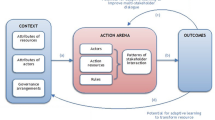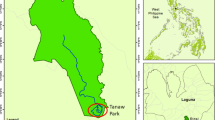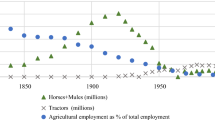Abstract
Local people’s preferences for how revenue from payments for environmental services (PES) schemes is distributed and used, and their ability to influence spending decisions, can shape the scheme’s effectiveness in achieving forest management and poverty reduction goals. We examine how the interplay between institutions, norms, and decision-making processes influences the outcomes of PES in Son La Province, Vietnam. Using information gathered in focus group discussions and interviews, we find that decisions are shaped by the perceived trustworthiness and capability of village authorities and by local definitions of “equity”. Our analysis also suggests that combining revenue-distribution options may be more likely to result in effective, efficient, and equitable outcomes while also supporting rural development. Our findings offer useful lessons for benefit sharing for REDD+ (reducing emissions from deforestation and forest degradation). PES and REDD+ revenues could be most effective when considered as supplements to budgets for social and economic development programs.






Similar content being viewed by others
References
Angelsen, A., Brockhaus, M., Kanninen, M., Sills, E., Sunderlin, W. D., and Wertz-Kannounikoff, S. (eds.) (2009). Realising REDD+: National strategy and policy options. Center for International Forestry Research, Bogor.
Angelsen, A. (2012). “What does REDD+ cost?” is (almost) a meaningless question. In Angelsen, A., Brockhaus, M., Sunderlin, W. D., and Verchot, L. (eds.), Analysing REDD+: Challenges and Choices. Center for International Forestry Research, Bogor.
Archer, D. W., Dawson, J., Kreuter, U. P., Hendrickson, M., and Halloran, J. (2008). Social and political influences on agricultural systems. Renewable Agriculture and Food Systems 23(4): 272–284.
Bond, I., Grieg-Gran, M., Wertz-Kanounnikoff, S., Hazlewood, P., Wunder, S., and Angelsen, A. (2009). Incentives to Sustain Forest Ecosystem Services: A Review and Lessons for REDD. Natural Resource Issues No. 16. International Institute for Environment and Development, London, UK, with CIFOR, Bogor, Indonesia, and World Resources Institute, Washington, D.C., USA.
Bryan, B. A. (2013). Incentives, Land Use and Ecosystem Services: Synthesizing Complex Linkages. Environmental Science and Policy 27: 124–134.
Clements, T., John, A., Nielsen, K., An, D., Tan, S., and Milner-Gulland, E. J. (2010). Payments for Biodiversity Conservation in the Context of Weak Institutions: Comparison of Three Programs from Cambodia. Ecological Economics 69: 1283–1291.
Corbera, E., Kosoy, N., and Martinez Tuna, M. (2007). Equity implications of marketing ecosystem services in protected areas and rural communities: Case studies from Meso-America. Global Environmental Change 17(3–4): 365–380.
Corbera, E., Soberanisc, G. C., and Brown, K. (2009). Institutional dimensions of payments for ecosystem services: An analysis of Mexico’s carbon forestry programme. Ecological Economics 68: 743–761.
Costenbader, J. (2011). REDD+ Benefit Sharing: A Comparative Assessment of Three National Policy Approaches. UN-REDD Programme and Forest Carbon Partnership Facility, Geneva.
Courtney, P. (2010). Socio-economic Impacts and Benefits of Agri-Environment Schemes in England. Presented at the Social Dimensions of Market Based Environmental Incentives International Forum. Charles Darwin University, Darwin, Australia. 18–19 November.
Dietz, T., Ostrom, E., and Stern, P. C. (2003). The struggle to govern the commons. Science 302: 1907–1912.
Engel, S., Pagiola, S., and Wunder, S. (2008). Designing Payments for Environmental Services in Theory and Practice: An Overview of the Issues. Ecological Economics 65: 663–674.
Enters, T., and Nguyen, Q. T. (2009). Final Evaluation Report: Community Forestry Pilot Program. Vietnam Ministry of Agriculture and Rural Development, Hanoi.
Government of Vietnam (2012). Decision 779/QÄ•-TTg dated on 27 June 2012 on national action plan for emission reduction through reducing deforestation, forest degradation, sustainable management of forest resources, conservation and improvement of forest carbon stock period 2011–2020. Government of Vietnam, Hanoi, Vietnam.
Greiber, T. (2010). Enabling Conditions and Complementary Legislative Tools for PES. Payments for Ecosystem Services and Food Security, Trade and Markets Division. International Year of Natural Fibres Coordinating Unit, Rome.
Huang, M., and Upadhyaya, S. (2007). Watershed-based Payment for Environmental Services in Asia. Working Paper No. 06–07 August 2007, Sustainable Agriculture and Natural Resource Management Collaborative Research Support Programme (SANREM CRSP), Office of International Research, Education and Development (OIRED). Virginia: Virginia Polytechnic Institute and State University
International Union for Conservation of Nature (IUCN) (2010). Supporting REDD Implementation in Vietnam, Laos and Cambodia Through the Design of a REDD-Compliant Benefit Distribution System. IUCN, Bangkok.
Kandel, S., and Cuéllar, N. (2011). Compensating for Ecosystem Services: Directions, Potentials and Pitfalls for Rural Communities. Fundación PRISMA, El Salvador.
Kerr, J., Vardhan, M., and Jindal, R. (2012). Prosocial Behavior and Incentives: Evidence from Field Experiments in Rural Mexico and Tanzania. Ecological Economics 73: 220–227.
Lee, E., and Mahanty, S. (2009). Payments for Environmental Services and Poverty Reduction: Risks and Opportunities. Regional Community Forestry Training Center for Asia and the Pacific, Bangkok.
Lindhjem, H., Aronsen, I., Bråten, K. G., and Gleinsvik, A. (2010). Experiences with Benefit Sharing: Issues and Options for REDD-plus. Econ Pöyry, Oslo.
Luttrell, C., Loft, L., Gebara, M. F., and Kweka, D. (2012). Who Should Benefit and Why? Discourses on REDD+ Benefit Sharing. In Angelsen, A., Brockhaus, M., Sunderlin, W. D., and Verchot, L. (eds.), Analysing REDD+: Challenges and Choices. Center for International Forestry Research, Bogor.
Mayrand, K., and Paquin, M. (2004). Payments for environmental services: a survey and assessment of current schemes. Unisfera International Centre for the Commission for Environmental Cooperation of North America, Montreal.
Neef, A., and Thomas, D. (2009). Rewarding the upland poor for saving the commons? Evidence from Southeast Asia. International Journal of the Commons 3(1): 1–15.
Nguyen, H. Q., and Pham, X. P. (2006). Report on Community Forestry in Vietnam – Potentials, Opportunities and Challenges. Forestry Sector Manual (in Vietnamese). Forest Science Institute of Vietnam, Hanoi.
Nguyen, Q. T. (2011). Payment for environmental services in Vietnam: An analysis of the pilot project in Lam Dong province. Occasional Paper No.5. The Center for People and Forests, Hanoi.
Pagiola, S., Arcenas, A., and Platais, G. (2005). Can payments for environmental services help reduce poverty? An exploration of the issues and the evidence to date from Latin America. World Development 33(2): 237–253.
Pascual, U., Muradian, R., Rodriguez, L. C., and Duraiappah, A. K. (2009). Revisiting the Relationship between Equity and Efficiency in Payments for Environmental Services. Division of Environmental Policy Implementation, UNEP, Nairobi.
Pattanayak, S. K., Wunder, S., and Ferraro, P. J. (2010). Show Me the Money: Do Payments Supply Environmental Services in Developing Countries? Review of Environmental Economics and Policy 4: 254–274.
Peskett, L. (2011). REDD+ Benefit Sharing in Indonesia. World Bank and REDD-net, Washington, D.C.
Pham, T. T., Campbell, B. M., and Garnett, S. (2009). Lessons learnt and pitfalls of PES projects in Vietnam. Asian Pacific Journal of Public Administration 31(2): 117–135.
Pham, T. T., Brockhaus, M., Wong, G., Dung, L. N., Tjajadi, J. S., Loft, L., Luttrell, C., and Mvondo, S. A. (2013a). Approaches to benefit sharing: A preliminary comparative analysis of 13 REDD+ countries. Center for International Forestry Research, Bogor.
Pham, T. T., Bennett, K., Vu, T. P., Brunner, J., Le, N. D., and Nguyen, D. T. (2013b). Payments for forest environmental services in Vietnam: From policy to practice. Center for International Forestry Research, Bogor.
Rodriguez, L. C., Pascual, U., Muradian, R., Pazmino, N., and Whitten, S. (2011). Towards a Unified Scheme for Environmental and Social Protection: Learning from PES and CCT Experiences in Developing Countries. Ecological Economics 70: 2163–2174.
Son La Forestry Department (2012). Annual report. Son La Forestry Department, Son La City.
Springate-Baginski, O., and Wollenberg, E. (eds.) (2010). REDD, Forest Governance and Rural Livelihoods: The Emerging Agenda. Center for International Forestry Research, Bogor.
To, T. T. H., and Hess, J. (2010). Connecting local forest managers with beneficiaries: payments for forest environmental services in Vietnam. The Center for People and Forests, Bangkok.
van Noordwijk, M., and Leimona, B. (2010). Principles for Fairness and Efficiency in Enhancing Environmental Services in Asia: Payments, Compensation, or Co-investment? Ecology and Society 15(4): 17. www.ecologyandsociety.org/vol15/iss4/art17/.
van Noordwijk, M., Leimona, B., Jindal, R., Villamor, G. B., Vardhan, M., Namirembe, S., Catacutan, D., Kerr, J., Minang, P. A., and Tomich, T. P. (2012). Payments for Ecosystem Services (PES): Evolution Towards Efficient and Fair Incentives for Multifunctional Landscapes. Annual Review of Environment and Resources 37: 389–420.
Vatn, A. (2010). An Institutional Analysis of Payments for Environmental Services. Ecological Economics 69: 1245–1252.
Vatn, A., and Vedeld, P. (2011). Getting Ready! A Study of National Governance Structures for REDD+. Noragric Report No. 59. Ås: Department of International Environment and Development Studies at the Norwegian University of Life Sciences
Vignola, R., McDaniels, T. L., and Scholz, R. W. (2012). Negotiation analysis for mechanisms to deliver ecosystem services: The case of soil conservation in Costa Rica. Ecological Economics 75: 22–31.
White, D., and Minang, P. (eds.) (2010). Estimating the Opportunity Costs of REDD+: A Training Manual. Washington, D.C: World Bank
Wode, B., and Bao, H. (2009). Study on State of the Art of Community Forestry in Vietnam. GTZ, Hanoi.
Wunder, S. (2005). Payments for environmental services: Some nuts and bolts. Center for International Forestry Research, Bogor.
Wunder, S. (2009). Can Payments for Environmental Services Reduce Deforestation and Forest Degradation? Center for International Forestry Research, Bogor.
Zabel, A., and Roe, B. (2009). Analysis Optimal design of pro-conservation incentives. Ecological Economics 69: 126–134.
Acknowledgments
The data and analysis presented here form part of the policy component of CIFOR’s Global Comparative Study on REDD. We gratefully acknowledge the support received from the Norwegian Agency for Development Cooperation, the Australian Agency for International Development, the UK Department for International Development, the European Commission, and the Department for International Development Cooperation of Finland. We would like to express our thanks to Cecilia Luttrell and Sven Wunder (CIFOR), Sango Mahanty (Australian National University) and Paula Williams (Forest Carbon, Markets and Communities program) for their valuable comments.
Author information
Authors and Affiliations
Corresponding author
Rights and permissions
About this article
Cite this article
Pham, T.T., Moeliono, M., Brockhaus, M. et al. Local Preferences and Strategies for Effective, Efficient, and Equitable Distribution of PES Revenues in Vietnam: Lessons for REDD+. Hum Ecol 42, 885–899 (2014). https://doi.org/10.1007/s10745-014-9703-3
Published:
Issue Date:
DOI: https://doi.org/10.1007/s10745-014-9703-3




